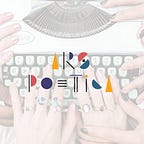9TH ANNUAL NAPOMO 30/30/30 :: DAY 16 :: ER Pulgar on Ariana Reines
For Anna.
****
It was after the announcement that travelers to Argentina from the U.S. would be placed under a mandatory fourteen-day quarantine and The Met would be closed until further notice that I began taking COVID-19 seriously. It was a fake text message about New York City shutting down because of a lunch between millionaires that sent me and others who weren’t raised in the city back home to quarantine with family. It was in the period between the 6 A.M. flight and my buying the ticket at 10 P.M. that I packed enough for what I assumed would be two weeks and reread texts that gave me hope, scavenging for answers in the uncertainty we were all to plunge into. One of these was Ariana Reines’ latest, A Sand Book.
My favorite poem from this revelatory text reminds me often of the place I’ve come to call home, conjuring a quotidian scene on the avenue that marks the Bushwick-Ridgewood border I’ve traversed on both sides, physically and emotionally:
What she gets right in “Contender” she got right across her vast catalogue of work, one that spans epic-length epistolary reflections of love in the Internet Age to bovine elegies and distorted prayers to the god of communication. Reines’ work cannot be pinned down because it is indeed this expansive: she’s a consummate poet in that she observes and records the magic inside the quotidian.
I’ve known Reines and her writing since 2016, when I had the great privilege of being her student and seeing how she incorporated her practice as an astrologer into our workshop. Her multi-disciplinary and multi-dimensional ways of seeing have forever altered my writing. I can no longer observe a bird without attempting to mold a game from its flight, no longer look at sand without analyzing how it shifts. There’s a magic in everything; I’ve had to believe in it seeing the strange place I fit into as an immigrant that came over very young, a migration I did not choose and am forever grateful for and attempting to deconstruct.
In the spirit of a curation about poets and wanderers, I knew I had to speak to her. We kept in touch past the class, emailing infrequently as I followed her travels to France, to Georgia, to Argentina. We spoke a few days before the routine of the world was disrupted — I told her excitedly of a month-long trip that I would have to postpone in the wake of the virus. We talked and laughed and mused about her book, the neo-Bardic tradition, and freedom of the mind and body in a time of limitation.
I became a journalist because I believe artists and musicians best capture the truth in their art and I want to expand that message. They remain, after years of interviewing, the most fascinating people to speak to. It is through their work we can find kernels of the truth. Below, I’ve turned a fruitful interview with my favorite contemporary writer into an erasure poem — for those unfamiliar, it’s a cut-up of a larger text to craft something new from the remains.
Some of you, myself included, might be wondering why I chopped up our conversation into a poem instead of presenting Reines’ wisdom in full form. To that I offer two answers:
1. A not-so-secret of the journalism trade: the journalist always works in limitations, a piece must and will always be edited and condensed to find its spirit.
2. The job of the journalist and the poet is the same, despite differing methods: to observe, record, and broadcast the truth to the best of their ability.
I present here an experiment in dissecting our reality and of an important pre-quarantine conversation with one of our most important writers (and an important mentor). With all humility, I hope this can be a possible roadmap through this dark night of the soul.
Be kind to each other, stay inside, and Happy National Poetry Month — may our journey inward be as bountiful as the one we’re collectively taking.
****
Bardic Notes in The Time of Coronavirus
E.R. Pulgar is a Venezuelan-American poet and music journalist. He is an MFA Candidate in poetry at Columbia University, holds a B.A. from New York University, and is Ars Poetica’s Wandering Bard. His criticism has appeared in Rolling Stone, i-D, Playboy, Remezcla and elsewhere and his poetry has appeared in Pank Magazine, Blush, Brio and Dion Ys Us. Quarantined in Miami, he lives in New York City.
Named one of Flavorwire’s 100 Most Important Living Writers and “a crucial voice of her generation” by Michael Silverblatt of NPR Bookworm, Ariana Reines is a poet, Obie-winning playwright, and performing artist. Her books include A Sand Book, the play Telephone, The Origin Of The World, Mercury, Coeur de Lion, and The Cow.
